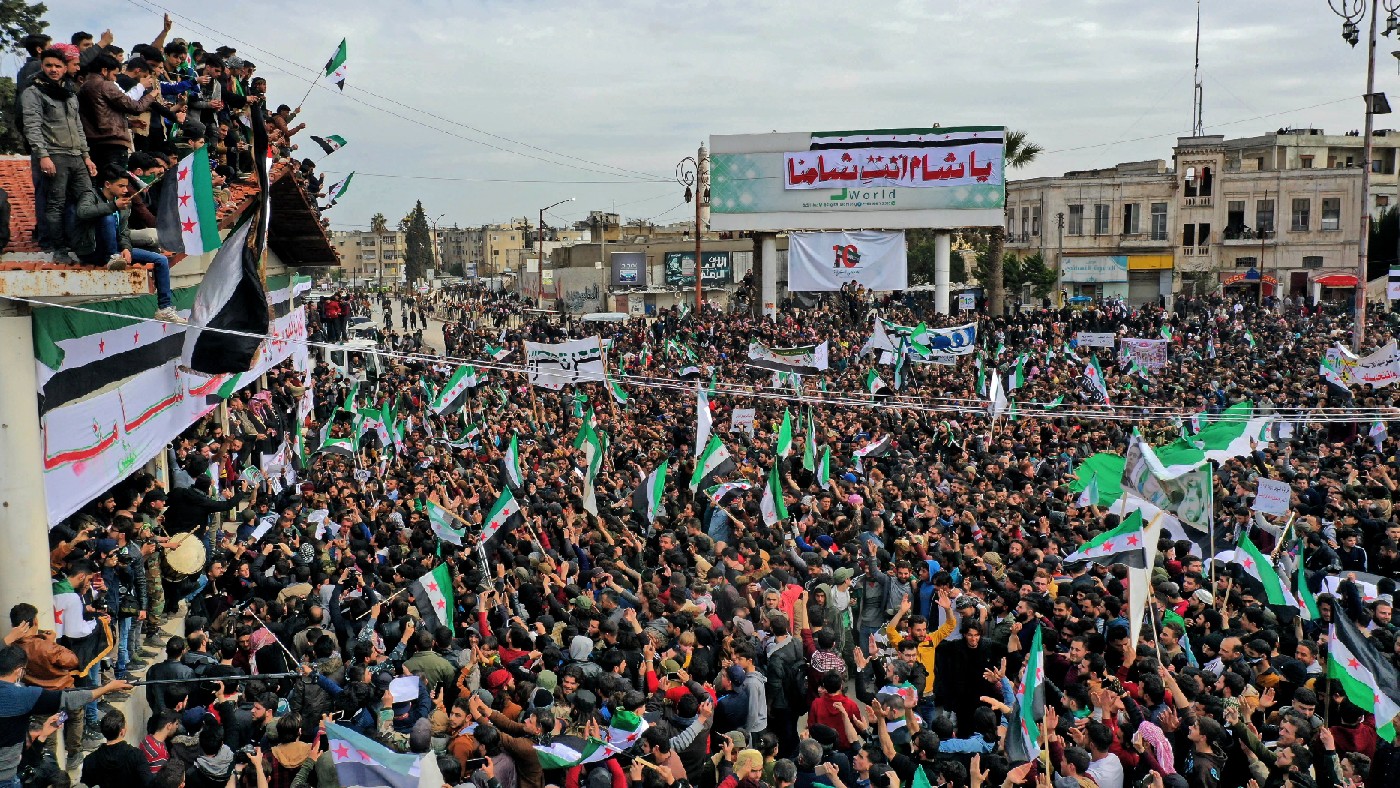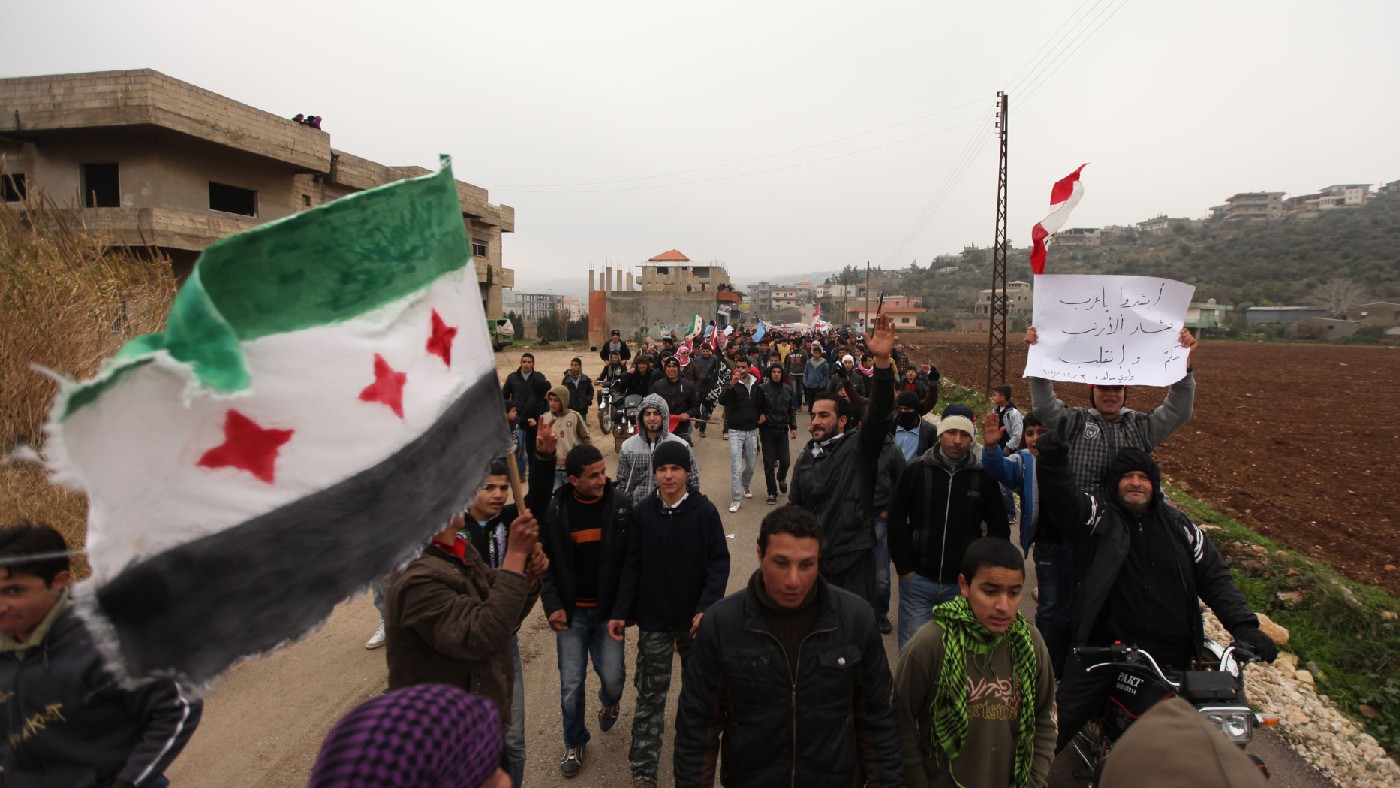From the Arab Spring to a refugee crisis: exploring Syria’s decade of civil war
Ten years after the first battles between Syrian government forces and the armed opposition, no resolution is in sight

A free daily email with the biggest news stories of the day – and the best features from TheWeek.com
You are now subscribed
Your newsletter sign-up was successful
Right now, the nation is divided into three main areas of control. President Bashar al-Assad's government rules about 70% of the country, having fought back rebel forces from the outskirts of the capital, Damascus, and regained control over Syria’s other big cities such as Aleppo and Homs.
The northwestern province of Idlib is the last major stronghold of the opposition, dominated there by the jihadist alliance Hayat Tahrir al-Sham. Northeastern Syria is now a de facto autonomous Kurdish region, Rojava, controlled by a US-backed militia, the Syrian Democratic Forces (SDF).
In addition, there are other enclaves: on Rojava’s northern border with Turkey are buffer zones seized by Turkish troops and their Sunni Arab allies, to prevent Kurdish forces allying with separatist Kurds inside Turkey. There are pockets of rebel control and even Isis remnants in the south.
The Week
Escape your echo chamber. Get the facts behind the news, plus analysis from multiple perspectives.

Sign up for The Week's Free Newsletters
From our morning news briefing to a weekly Good News Newsletter, get the best of The Week delivered directly to your inbox.
From our morning news briefing to a weekly Good News Newsletter, get the best of The Week delivered directly to your inbox.
How did the situation come about?
The war began with a brutal crackdown on protests in the Arab Spring of 2011, but escalated into a military conflict that autumn, when sections of Assad’s forces began to defect and take up arms against the government.
The protests were at first largely against economic hardship, but soon began to reflect the nation’s longstanding sectarian divisions, with a Sunni Arab majority rising up against Assad’s government and security forces, which are dominated by his Alawite sect, a branch of Shia Islam.
And increasingly it became a sectarian proxy war: the government was backed by Iran and the Lebanese militia group Hezbollah (and, decisively, Russia); Sunni rebels were backed by the Gulf states and Turkey.
A free daily email with the biggest news stories of the day – and the best features from TheWeek.com
In addition, the war changed abruptly when the Isis caliphate was declared in Syria in 2013. As Isis pushed into Kurdish areas, US forces backed the predominantly Kurdish SDF, which fought and defeated Isis, taking its capital Raqqa in 2017.

How was the current stalemate reached?
At its lowest point, in 2014, Assad’s government controlled only 30% of the country. With Russian and Iranian support it has survived, but at a cost: Hezbollah controls some of its territory; the current boundaries have been set by the proxy powers, notably Russia, making informal peace deals.
The conflict has been largely frozen since March 2020, when – after Turkish troops came into direct confrontation with Russian-backed government forces in northwestern Syria – Turkey and Russia set up a buffer zone to de-escalate the situation.
However, fighting continues: Russian and government forces are shelling Idlib; there are skirmishes between the SDF and Turkish-backed forces on the Turkish border. Last month, Assad’s forces entered the southern city of Deraa, a rebel stronghold, for the first time in ten years. “The war on Syrian civilians continues,” warns the UN.
What has been the human cost?
Atrocities have been committed by all sides, but particularly by Assad’s forces, which became notorious for targeting civilian areas with shells, barrel bombs and chemical weapons.
Last month the UN said it had documented a “minimum verifiable number” of 350,200 deaths as a result of the war, including 26,727 women and 27,126 children, but described this as “certainly an under-count”. The UK-based Syrian Observatory for Human Rights puts the total deaths at more than 606,000.
In March, the UN Commission of Inquiry on Syria said that tens of thousands of civilians who had been detained by the regime were still “disappeared”. The war also created the greatest refugee crisis of this century.
How many people were displaced?
The UN estimates that 13.5 million Syrians have been forcibly displaced since 2011, more than half of the country’s pre-war population of 22 million: 6.7 million have beeen displaced within Syria; and 6.8 million have sought refuge abroad. Turkey has received the most refugees – 3.6 million by early this year – and Lebanon 865,000. Germany has taken 675,000 Syrians, Sweden 190,000 – and the UK 23,000.
In March, Syria’s parliament ratified a new law stripping citizenship from anyone who fails to renew their identity card after ten years; but those who return risk imprisonment, torture and death.
How are conditions in Syria today?
Dire. In July 2021, the UN estimated that almost 50% of Syrian families were going hungry. Under Assad’s rule, a combination of war damage, corruption, Western sanctions, Covid-19 and the collapse of banks in Lebanon, where many rich Syrians kept their money, has created economic devastation.
For the 3.4 million civilians in rebel-controlled Idlib – more than half of them displaced from elsewhere in Syria – things are even worse: about 75% of its population depends on UN aid.
In SDF-run Rojava, however, conditions are relatively good. The autonomous government controls Syria’s oil, which it sells to Iraq, meaning that it is able to pay local officials and run basic services. Raqqa, the former Isis capital, was recently described as a “boom town”.
Is a lasting peace likely?
Not yet. Talks between the Syrian government and opposition groups will resume this month in Geneva. But as Geir Pedersen, the UN special envoy for Syria, admitted, negotiations have “not yet begun to make steady progress”.
Talks between Russia and Turkey last week also brought no change, and some analysts think renewed fighting in Idlib is likely. However, the Assad regime’s relations with the Arab world are slowly being normalised: neighbouring Jordan has opened up its main border to Syria, and Egypt has pledged to work towards returning it to the Arab League, ten years after it was suspended for the brutal suppression of protests.
The US state department, for its part, said that “there is no question of the US normalising relations with [Assad’s] government at this time”.